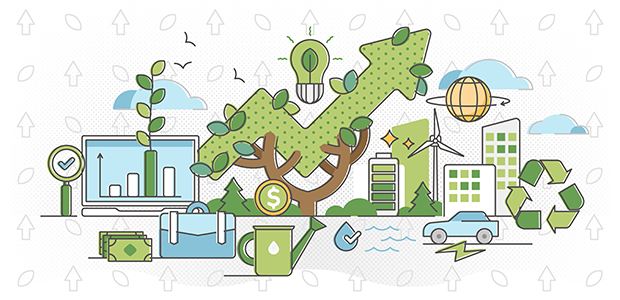
Why businesses no longer have to choose between growth and sustainability
Government, shackled by the need to appease voters and navigate political agendas, simply can't drive the change we need to reach net zero. Political parties struggle to lead in climate innovation because their policies often prioritise large, established sectors over nimble, innovation-driven startups.
Labour, now in power after the recent UK election, focuses heavily on traditional industries like steel in its manifesto, allocating significant funds to these sectors. While it’s important to have domestic steel production, Labour's £2.5 billion allocation towards it will have limited economic impact, as it focuses only on two manufacturing sites, Scunthorpe and Port Talbot, which are transitioning to less labour-intensive technology. As a result, this ends up neglecting the capital needs of startups and small businesses that could drive substantial employment, growth, while also helping to solve the net zero challenge.
The idea that businesses must choose between economic growth and sustainability is not only outdated but fundamentally flawed. McKinsey reports that successful companies integrating Environmental, Social, and Governance (ESG) initiatives into their growth plans outperform their competitors, as long as they also maintain superior performance across business fundamentals and technological advancements are the engine behind this new paradigm.
The evidence is already there, as the demand for supply chain sustainability is sparking global digital transformation. But while electric vehicles, solar power, and carbon capture frequently make headlines, the real game-changers are often behind the scenes. Technologies like AI, data analytics, and automation are the unsung heroes that can drive substantial emission reductions and efficiency improvements for businesses.
Today’s climate emergency is not just a challenge; it represents a massive opportunity for business growth and a catalyst for innovation. Those who fail to seize this moment risk being left behind. Let's explore why businesses no longer have to choose between sustainability and growth, thanks to emergent technology, and how reshaping operations to enhance emission efficiencies can lead to thriving enterprises.
The Myth of the Binary Choice
The perceived dichotomy between sustainability and economic growth is like a broken compass that no longer leads us to our destination. The reality is that sustainability can drive growth, rather than hinder it. Companies that integrate sustainable practices into their operations often find themselves reaping unexpected benefits. From cost savings achieved through energy efficiency to the brand loyalty cultivated by eco-conscious consumers, the advantages are manifold.
Moreover, sustainability isn't just about cutting emissions; it's about creating resilient businesses that can withstand the shocks of a rapidly changing world. By embracing sustainable practices, businesses can future-proof themselves against regulatory changes, resource scarcity, and shifting market demands.
The Power of Technology
Technological innovations are not just tools; they are transformative forces that can reshape industries from the ground up. AI systems can monitor and adjust energy usage in real-time, ensuring efficient consumption and reducing waste. By predicting energy needs and automating adjustments, AI minimises operational costs and integrates renewable energy sources effectively, enhancing sustainability.
Data analytics can offer deep insights into the supply chain, revealing inefficiencies and suggesting improvements. By analysing large datasets, businesses can streamline operations, reduce waste, and enhance productivity. Predictive analytics also helps in forecasting demand and managing disruptions proactively.
Automation can replace repetitive manual tasks with efficient systems, speeding up operations and reducing errors. This shift cuts energy use and lowers operational costs while allowing human workers to focus on higher-value tasks, boosting overall productivity and innovation. Through technology that leverages AI, data analytics and automation to reduce carbon emissions, companies can simultaneously increase efficiency and profitability.
The Global Shift
We are already witnessing the global impact of this technological revolution. As industries demand greater supply chain sustainability, companies globally are responding. This shift is not driven by government mandates but by market forces. Consumers are increasingly choosing products from companies that demonstrate a commitment to sustainability, and investors are favouring firms that integrate Environmental, Social, and Governance (ESG) criteria into their operations.
Take the example of the retail industry, which is responsible for over a quarter of global emissions, mainly through Scope 3. Innovative retailers are now using AI to predict consumer trends, optimising inventory levels and reducing waste. They are leveraging data analytics to ensure sustainable sourcing and transparency throughout their supply chains. Automation is being used to minimise energy consumption in manufacturing processes. These changes are not only reducing the industry's carbon footprint but also driving growth by meeting consumer demand for sustainable products.
For those who seize this opportunity, the rewards are substantial. Businesses that integrate AI, data analytics, and automation into their operations can generate significant improvements in efficiency and cost savings. They are also better positioned to adapt to future challenges, from regulatory changes to market fluctuations, gaining a competitive edge.
The message is clear: those who embrace sustainable practices and leverage emergent technologies will thrive, while those who don't will be left behind. The future of net-zero is in the hands of businesses, not governments. It's time to embrace a new paradigm where growth and sustainability go hand in hand.

